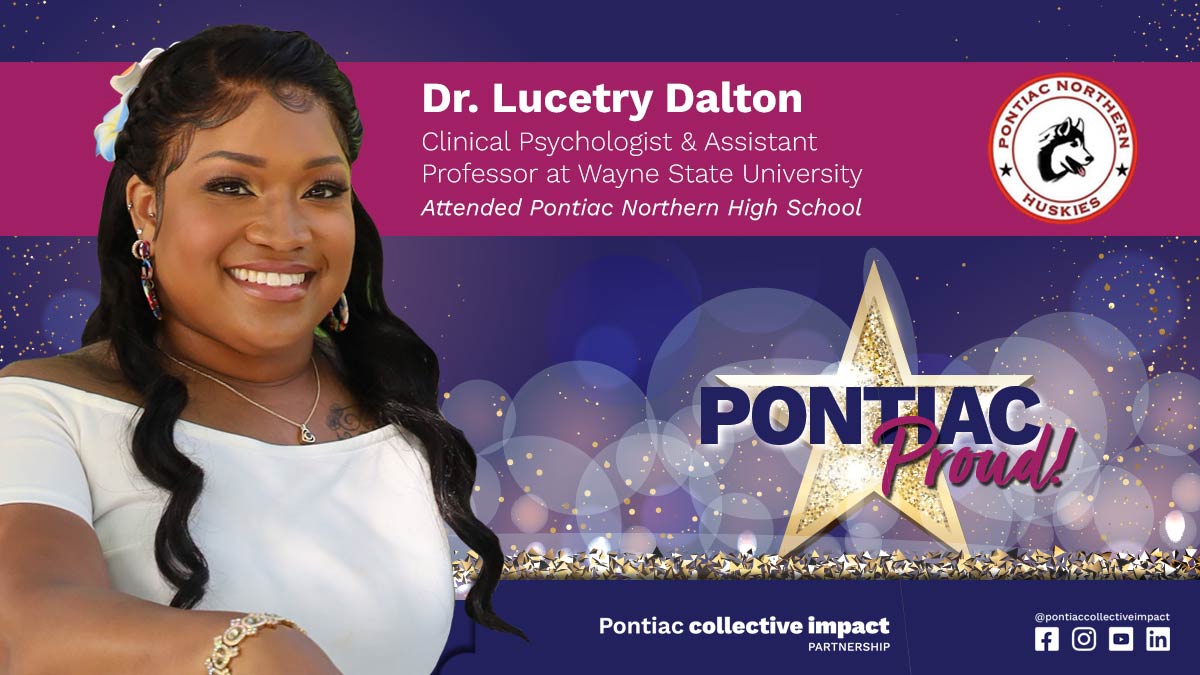Home » Pontiac Proud: Dr. Lucetry Dalton—Clinical Psychologist and Assistant Professor at Wayne State University
Pontiac Proud: Dr. Lucetry Dalton—Clinical Psychologist and Assistant Professor at Wayne State University
“Life is like a game of Spades; you can’t control the hand you’re dealt, but you can choose how to play it.”

Dr. Lucetry Dalton knew that she wanted to help her community from an early age. “I was really involved with my church, and when I was eleven, the nursery supervisor asked if I could help take care of the younger children. They called me the ‘child whisperer!’ But many of my favorite memories of growing up in Pontiac are from the church—Vacation Bible School, summer camp—and it gave me a foundational understanding of community and the importance of giving back.”
In high school at Pontiac Northern, Dr. Dalton was heavily involved in extracurricular activities—including several student organizations and various athletic leagues—as well as taking on the responsibilities of being her class secretary. “Teachers like Ms. Williams and Ms. Christian really challenged me; of course, as young students, many found their teaching style frustrating at times, but they definitely prepared me for college. Ms. Williams had really high expectations of us, and Ms. Christian’s AP English class laid the groundwork for me, for writing in college—in fact, I still rely a lot on what she taught me when I’m writing today.”
After graduating as a varsity scholar athlete, Homecoming Queen, Prom Queen, and Valedictorian of her class in 2007, Dr. Dalton attended the University of North Carolina at Chapel Hill, and her mom was instrumental in helping her choose her major. “She really has played a big part in my education. I wasn’t really sure at first what I would study in college, so we sat down and talked about what I was good at, my natural skills, and she said, ‘you know, people really open up to you, they talk to you, and you give really good advice, so maybe you should try psychology.’ I trust my mom’s judgment, so I went with it. Fortunately for me, the more classes that I took in the field, the more I fell in love with it!”
Once she achieved her Bachelor’s Degree in Psychology, she went on to graduate school. “I knew that, as a young Black woman, I would need the credentials—early—in order to be taken seriously. I knew I’d need those letters after my name. So I continued my studies right away at the Washington DC campus of the Chicago School of Psychology, eventually earning both my Masters and Doctorate in Clinical Psychology. People don’t often see someone who looks like me wearing the white coat and making the calls, and at first it was difficult for me, too. I’ve had to deal with a lot of microaggressions as a result, and there is an education component of it, too, in helping others overcome their implicit bias. That just because I’m young and Black and a woman, doesn’t mean I’m lesser than. I encourage those around me to check themselves, to broaden their concepts and ideas of what a doctor looks like, how they behave, and how they sound.”
And her experiences growing up in Pontiac have definitely shaped that perspective. “I often joke that I’m ‘sophisticated ratchet.’ You know, I am professional but I also can relate to people in my community on many levels and, especially when it comes to mental health in the Black community, that’s necessary. There’s not a lot of appreciation for mental health care, and that’s often a direct result of religious ideas that a higher being will help you manage through anything. We’re told to ‘just pray about it’ with no further action, guidance, or assistance. And as a Christian woman, I don’t discount the power of faith and spirituality, but I also believe that ‘faith without work is dead.’ It needs to be backed up by doing what you can to take care of yourself. You can’t pray away a broken arm! So I bring my faith, and my deep religious background, into the conversation when warranted. It helps me connect more with my community, and support them in ways that are unique to them.”
Dr. Dalton returned to Michigan in 2017 to work as a psychology fellow for Mclaren Hospital in Flint. Since then, she has worked in corporate healthcare settings, private practice, and focused on providing mental health services to professional athletes. She is also an Assistant Professor of Educational Psychology and Director of Clinical Training at Wayne State University.
“When I spoke at the commencement for Pontiac High School in 2018, I shared my philosophy of ‘finesse to success.’ That is, we may not necessarily have the same resources as other areas, but that doesn’t mean we can’t excel. We can finesse our way into our dreams; we’re resourceful, as a community, and we need to lean into that. So don’t let anyone tell you what you can or can’t do when it comes to achieving your goals. Look around your community, see who your partners are. Life is like a game of Spades; you can’t control the hand you’re dealt, but you can choose how you play it. And the beauty of Spades is that you have a partner that you can rely on, they’re your support system. Your family and friends, they’re there to help you—so even if you don’t have a great hand, you can still win with teamwork, strategy, and finesse.”




